SOCI1301 Sociology: A Sociological Analysis of Elderly Life History
VerifiedAdded on 2023/06/10
|13
|2923
|304
Report
AI Summary
This paper presents a sociological analysis of a 68-year-old female's life history, focusing on significant events such as marriage, parenthood, and retirement. The study employs a qualitative research method, utilizing an in-depth interview and semi-structured questions to gather data about her childhood, education, work life, and old age. Key social factors identified include religion, age, gender, social class, culture, ethnocentrism, economic class, and bureaucracy, which are analyzed in relation to her life experiences. The theoretical analysis applies social conflict theory to explain the struggles for social status and power dynamics encountered by the interviewee. The study concludes that the life history approach provides valuable insights into how individual experiences are shaped by broader social processes, highlighting the impact of social context on personal development and life choices. This document is available on Desklib, a platform offering a range of study tools and resources for students.
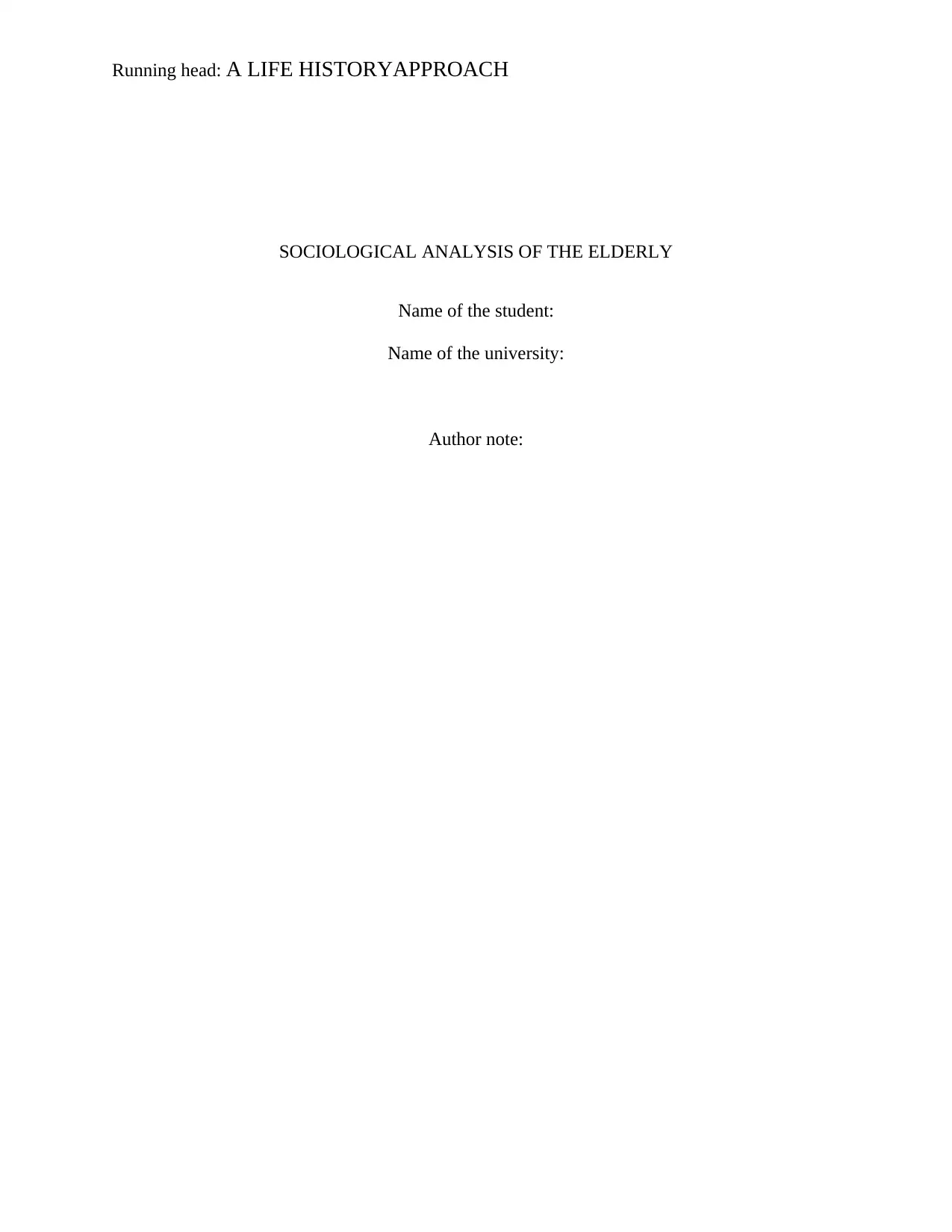
Running head: A LIFE HISTORYAPPROACH
SOCIOLOGICAL ANALYSIS OF THE ELDERLY
Name of the student:
Name of the university:
Author note:
SOCIOLOGICAL ANALYSIS OF THE ELDERLY
Name of the student:
Name of the university:
Author note:
Paraphrase This Document
Need a fresh take? Get an instant paraphrase of this document with our AI Paraphraser
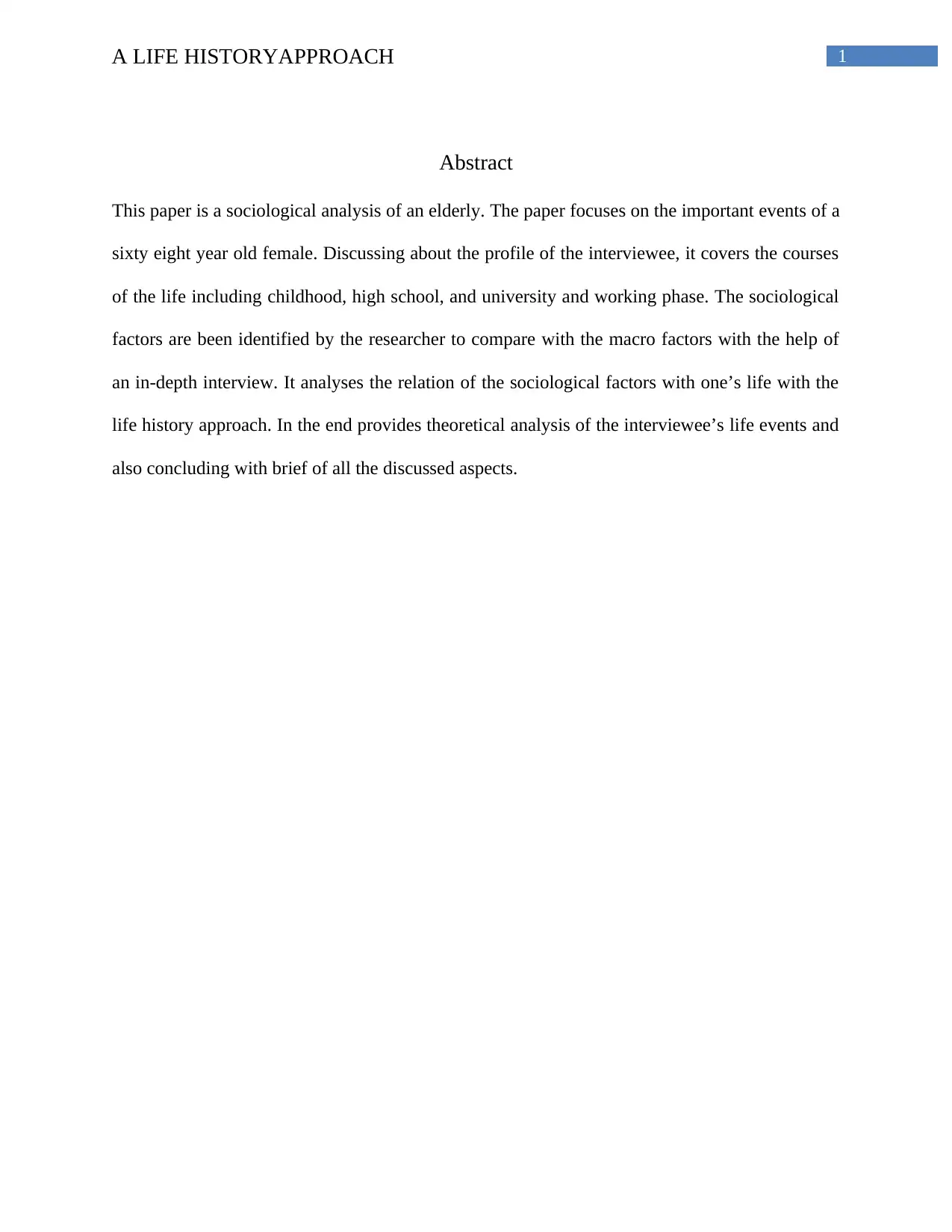
1A LIFE HISTORYAPPROACH
Abstract
This paper is a sociological analysis of an elderly. The paper focuses on the important events of a
sixty eight year old female. Discussing about the profile of the interviewee, it covers the courses
of the life including childhood, high school, and university and working phase. The sociological
factors are been identified by the researcher to compare with the macro factors with the help of
an in-depth interview. It analyses the relation of the sociological factors with one’s life with the
life history approach. In the end provides theoretical analysis of the interviewee’s life events and
also concluding with brief of all the discussed aspects.
Abstract
This paper is a sociological analysis of an elderly. The paper focuses on the important events of a
sixty eight year old female. Discussing about the profile of the interviewee, it covers the courses
of the life including childhood, high school, and university and working phase. The sociological
factors are been identified by the researcher to compare with the macro factors with the help of
an in-depth interview. It analyses the relation of the sociological factors with one’s life with the
life history approach. In the end provides theoretical analysis of the interviewee’s life events and
also concluding with brief of all the discussed aspects.
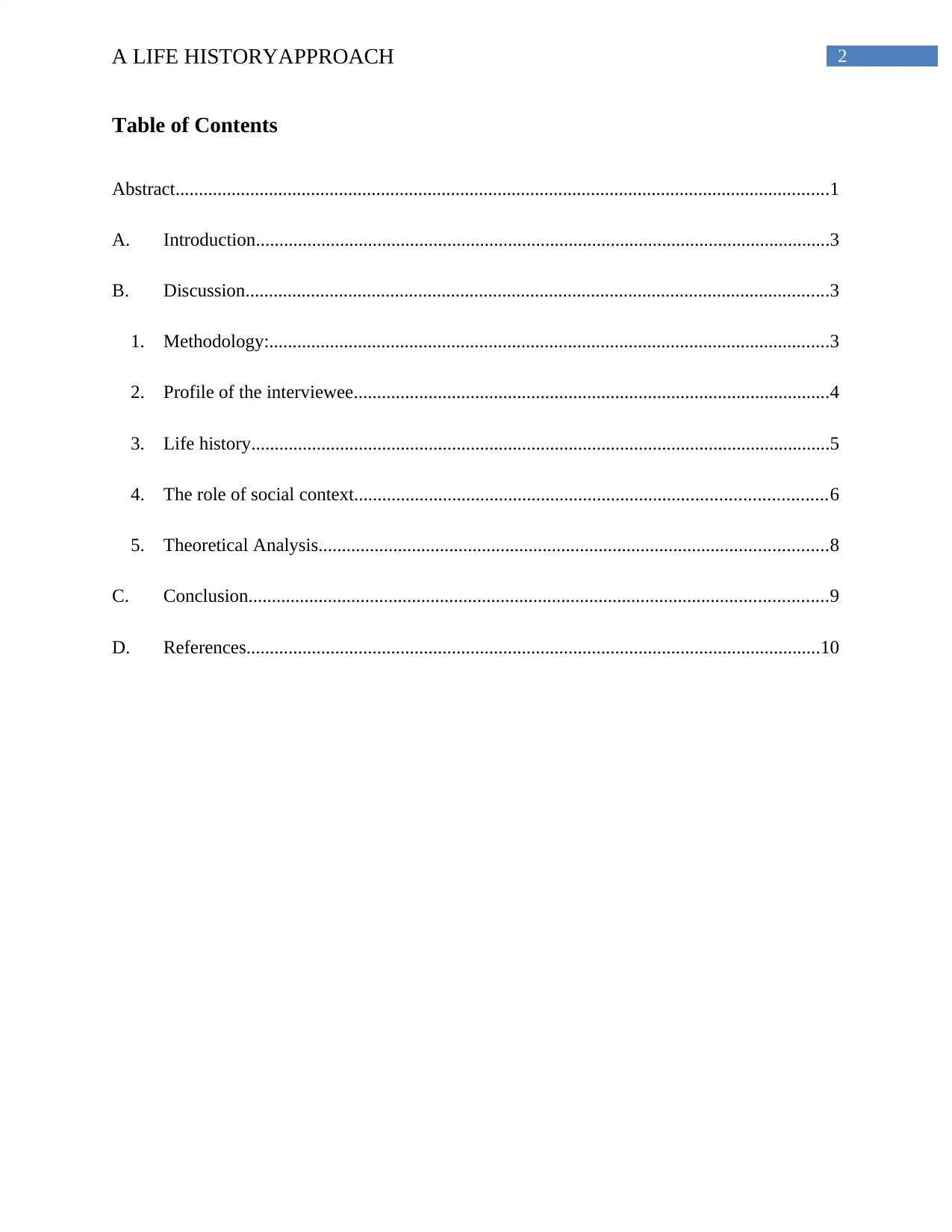
2A LIFE HISTORYAPPROACH
Table of Contents
Abstract............................................................................................................................................1
A. Introduction...........................................................................................................................3
B. Discussion.............................................................................................................................3
1. Methodology:........................................................................................................................3
2. Profile of the interviewee......................................................................................................4
3. Life history............................................................................................................................5
4. The role of social context.....................................................................................................6
5. Theoretical Analysis.............................................................................................................8
C. Conclusion............................................................................................................................9
D. References...........................................................................................................................10
Table of Contents
Abstract............................................................................................................................................1
A. Introduction...........................................................................................................................3
B. Discussion.............................................................................................................................3
1. Methodology:........................................................................................................................3
2. Profile of the interviewee......................................................................................................4
3. Life history............................................................................................................................5
4. The role of social context.....................................................................................................6
5. Theoretical Analysis.............................................................................................................8
C. Conclusion............................................................................................................................9
D. References...........................................................................................................................10
⊘ This is a preview!⊘
Do you want full access?
Subscribe today to unlock all pages.

Trusted by 1+ million students worldwide
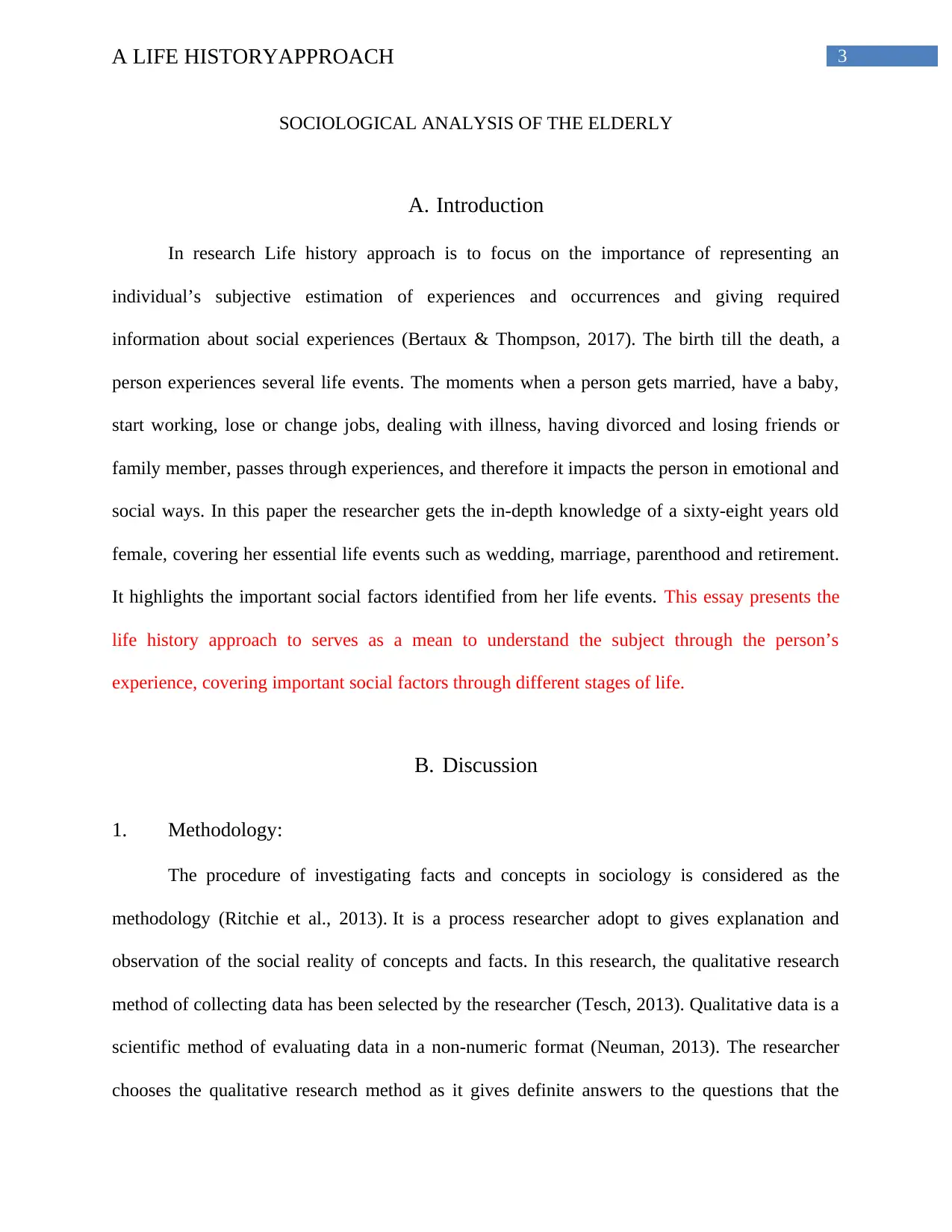
3A LIFE HISTORYAPPROACH
SOCIOLOGICAL ANALYSIS OF THE ELDERLY
A. Introduction
In research Life history approach is to focus on the importance of representing an
individual’s subjective estimation of experiences and occurrences and giving required
information about social experiences (Bertaux & Thompson, 2017). The birth till the death, a
person experiences several life events. The moments when a person gets married, have a baby,
start working, lose or change jobs, dealing with illness, having divorced and losing friends or
family member, passes through experiences, and therefore it impacts the person in emotional and
social ways. In this paper the researcher gets the in-depth knowledge of a sixty-eight years old
female, covering her essential life events such as wedding, marriage, parenthood and retirement.
It highlights the important social factors identified from her life events. This essay presents the
life history approach to serves as a mean to understand the subject through the person’s
experience, covering important social factors through different stages of life.
B. Discussion
1. Methodology:
The procedure of investigating facts and concepts in sociology is considered as the
methodology (Ritchie et al., 2013). It is a process researcher adopt to gives explanation and
observation of the social reality of concepts and facts. In this research, the qualitative research
method of collecting data has been selected by the researcher (Tesch, 2013). Qualitative data is a
scientific method of evaluating data in a non-numeric format (Neuman, 2013). The researcher
chooses the qualitative research method as it gives definite answers to the questions that the
SOCIOLOGICAL ANALYSIS OF THE ELDERLY
A. Introduction
In research Life history approach is to focus on the importance of representing an
individual’s subjective estimation of experiences and occurrences and giving required
information about social experiences (Bertaux & Thompson, 2017). The birth till the death, a
person experiences several life events. The moments when a person gets married, have a baby,
start working, lose or change jobs, dealing with illness, having divorced and losing friends or
family member, passes through experiences, and therefore it impacts the person in emotional and
social ways. In this paper the researcher gets the in-depth knowledge of a sixty-eight years old
female, covering her essential life events such as wedding, marriage, parenthood and retirement.
It highlights the important social factors identified from her life events. This essay presents the
life history approach to serves as a mean to understand the subject through the person’s
experience, covering important social factors through different stages of life.
B. Discussion
1. Methodology:
The procedure of investigating facts and concepts in sociology is considered as the
methodology (Ritchie et al., 2013). It is a process researcher adopt to gives explanation and
observation of the social reality of concepts and facts. In this research, the qualitative research
method of collecting data has been selected by the researcher (Tesch, 2013). Qualitative data is a
scientific method of evaluating data in a non-numeric format (Neuman, 2013). The researcher
chooses the qualitative research method as it gives definite answers to the questions that the
Paraphrase This Document
Need a fresh take? Get an instant paraphrase of this document with our AI Paraphraser
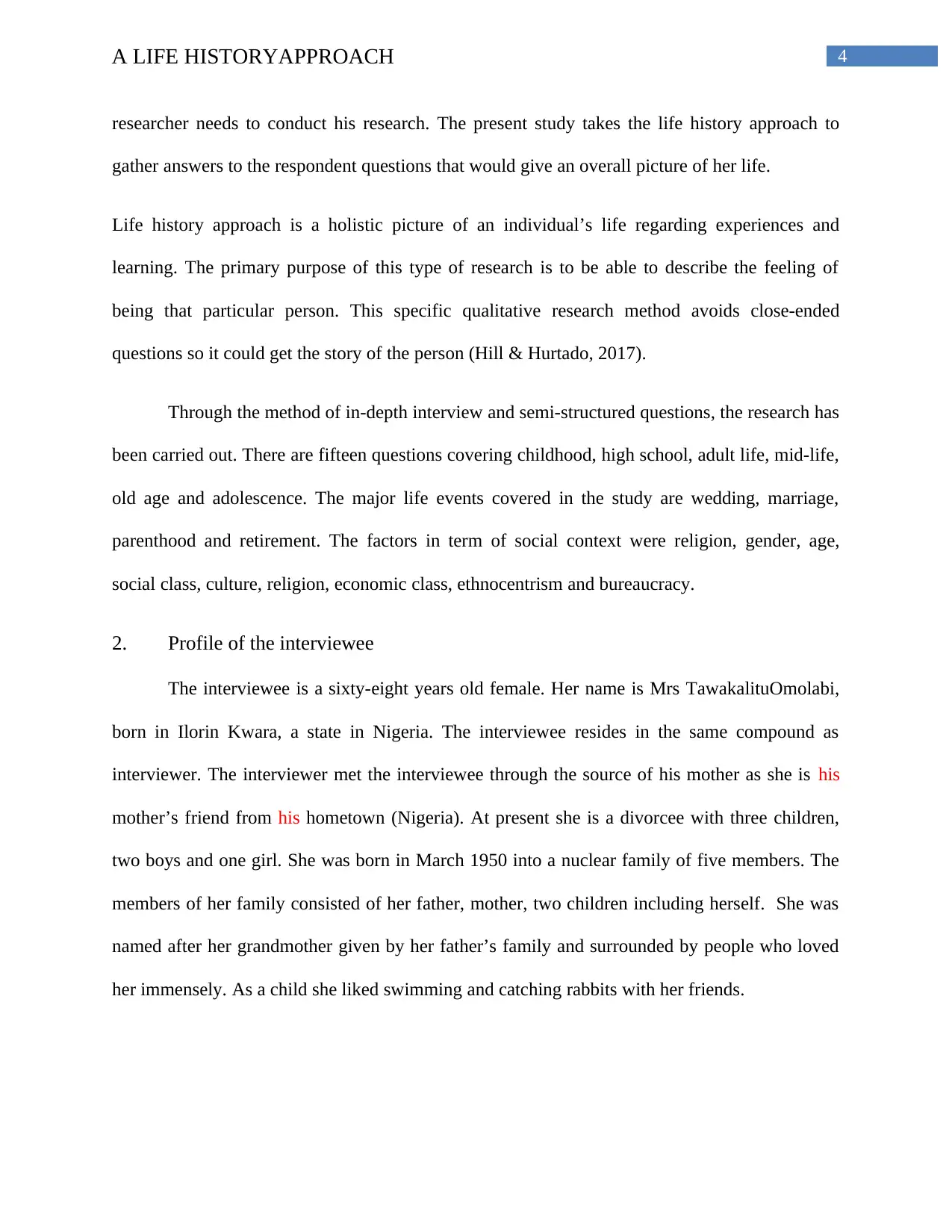
4A LIFE HISTORYAPPROACH
researcher needs to conduct his research. The present study takes the life history approach to
gather answers to the respondent questions that would give an overall picture of her life.
Life history approach is a holistic picture of an individual’s life regarding experiences and
learning. The primary purpose of this type of research is to be able to describe the feeling of
being that particular person. This specific qualitative research method avoids close-ended
questions so it could get the story of the person (Hill & Hurtado, 2017).
Through the method of in-depth interview and semi-structured questions, the research has
been carried out. There are fifteen questions covering childhood, high school, adult life, mid-life,
old age and adolescence. The major life events covered in the study are wedding, marriage,
parenthood and retirement. The factors in term of social context were religion, gender, age,
social class, culture, religion, economic class, ethnocentrism and bureaucracy.
2. Profile of the interviewee
The interviewee is a sixty-eight years old female. Her name is Mrs TawakalituOmolabi,
born in Ilorin Kwara, a state in Nigeria. The interviewee resides in the same compound as
interviewer. The interviewer met the interviewee through the source of his mother as she is his
mother’s friend from his hometown (Nigeria). At present she is a divorcee with three children,
two boys and one girl. She was born in March 1950 into a nuclear family of five members. The
members of her family consisted of her father, mother, two children including herself. She was
named after her grandmother given by her father’s family and surrounded by people who loved
her immensely. As a child she liked swimming and catching rabbits with her friends.
researcher needs to conduct his research. The present study takes the life history approach to
gather answers to the respondent questions that would give an overall picture of her life.
Life history approach is a holistic picture of an individual’s life regarding experiences and
learning. The primary purpose of this type of research is to be able to describe the feeling of
being that particular person. This specific qualitative research method avoids close-ended
questions so it could get the story of the person (Hill & Hurtado, 2017).
Through the method of in-depth interview and semi-structured questions, the research has
been carried out. There are fifteen questions covering childhood, high school, adult life, mid-life,
old age and adolescence. The major life events covered in the study are wedding, marriage,
parenthood and retirement. The factors in term of social context were religion, gender, age,
social class, culture, religion, economic class, ethnocentrism and bureaucracy.
2. Profile of the interviewee
The interviewee is a sixty-eight years old female. Her name is Mrs TawakalituOmolabi,
born in Ilorin Kwara, a state in Nigeria. The interviewee resides in the same compound as
interviewer. The interviewer met the interviewee through the source of his mother as she is his
mother’s friend from his hometown (Nigeria). At present she is a divorcee with three children,
two boys and one girl. She was born in March 1950 into a nuclear family of five members. The
members of her family consisted of her father, mother, two children including herself. She was
named after her grandmother given by her father’s family and surrounded by people who loved
her immensely. As a child she liked swimming and catching rabbits with her friends.
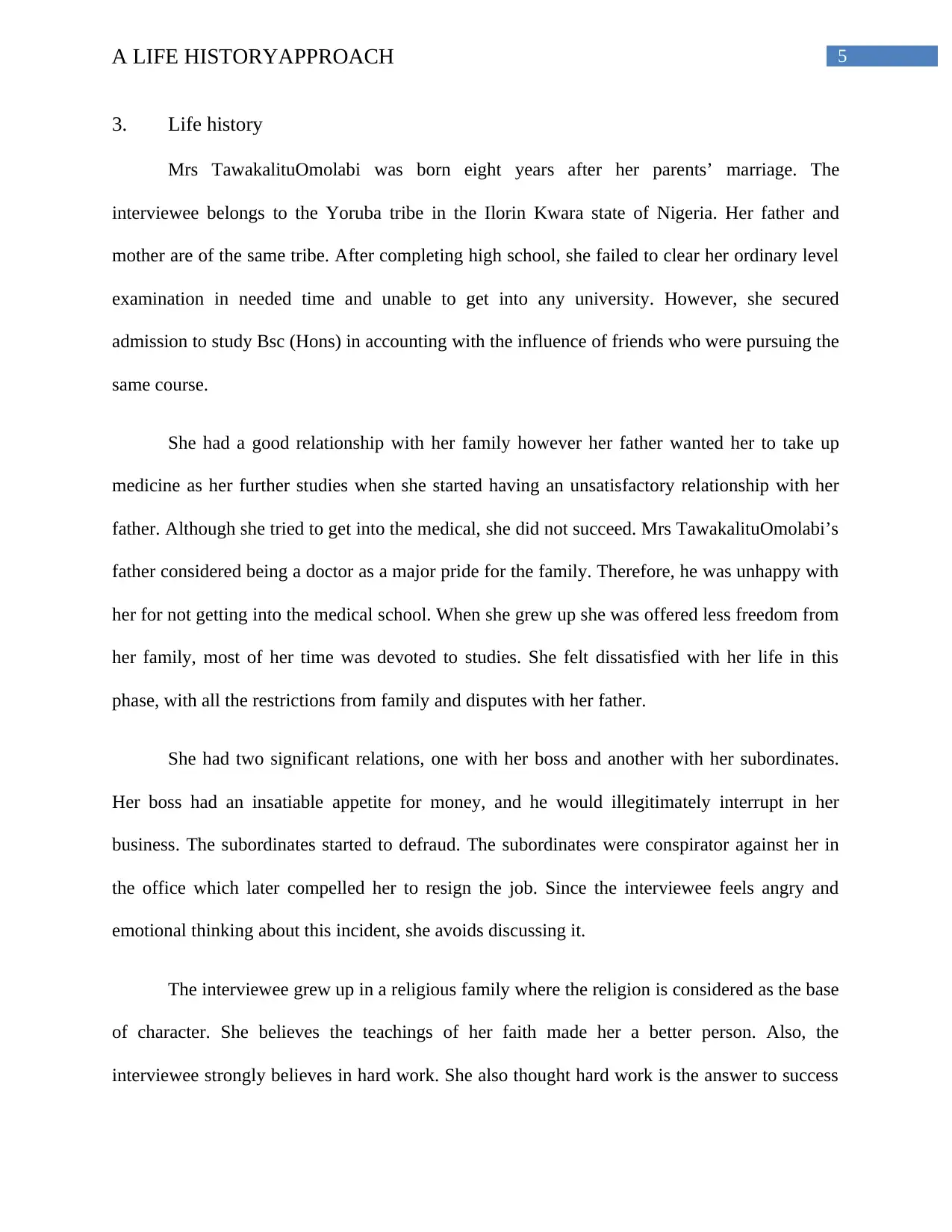
5A LIFE HISTORYAPPROACH
3. Life history
Mrs TawakalituOmolabi was born eight years after her parents’ marriage. The
interviewee belongs to the Yoruba tribe in the Ilorin Kwara state of Nigeria. Her father and
mother are of the same tribe. After completing high school, she failed to clear her ordinary level
examination in needed time and unable to get into any university. However, she secured
admission to study Bsc (Hons) in accounting with the influence of friends who were pursuing the
same course.
She had a good relationship with her family however her father wanted her to take up
medicine as her further studies when she started having an unsatisfactory relationship with her
father. Although she tried to get into the medical, she did not succeed. Mrs TawakalituOmolabi’s
father considered being a doctor as a major pride for the family. Therefore, he was unhappy with
her for not getting into the medical school. When she grew up she was offered less freedom from
her family, most of her time was devoted to studies. She felt dissatisfied with her life in this
phase, with all the restrictions from family and disputes with her father.
She had two significant relations, one with her boss and another with her subordinates.
Her boss had an insatiable appetite for money, and he would illegitimately interrupt in her
business. The subordinates started to defraud. The subordinates were conspirator against her in
the office which later compelled her to resign the job. Since the interviewee feels angry and
emotional thinking about this incident, she avoids discussing it.
The interviewee grew up in a religious family where the religion is considered as the base
of character. She believes the teachings of her faith made her a better person. Also, the
interviewee strongly believes in hard work. She also thought hard work is the answer to success
3. Life history
Mrs TawakalituOmolabi was born eight years after her parents’ marriage. The
interviewee belongs to the Yoruba tribe in the Ilorin Kwara state of Nigeria. Her father and
mother are of the same tribe. After completing high school, she failed to clear her ordinary level
examination in needed time and unable to get into any university. However, she secured
admission to study Bsc (Hons) in accounting with the influence of friends who were pursuing the
same course.
She had a good relationship with her family however her father wanted her to take up
medicine as her further studies when she started having an unsatisfactory relationship with her
father. Although she tried to get into the medical, she did not succeed. Mrs TawakalituOmolabi’s
father considered being a doctor as a major pride for the family. Therefore, he was unhappy with
her for not getting into the medical school. When she grew up she was offered less freedom from
her family, most of her time was devoted to studies. She felt dissatisfied with her life in this
phase, with all the restrictions from family and disputes with her father.
She had two significant relations, one with her boss and another with her subordinates.
Her boss had an insatiable appetite for money, and he would illegitimately interrupt in her
business. The subordinates started to defraud. The subordinates were conspirator against her in
the office which later compelled her to resign the job. Since the interviewee feels angry and
emotional thinking about this incident, she avoids discussing it.
The interviewee grew up in a religious family where the religion is considered as the base
of character. She believes the teachings of her faith made her a better person. Also, the
interviewee strongly believes in hard work. She also thought hard work is the answer to success
⊘ This is a preview!⊘
Do you want full access?
Subscribe today to unlock all pages.

Trusted by 1+ million students worldwide
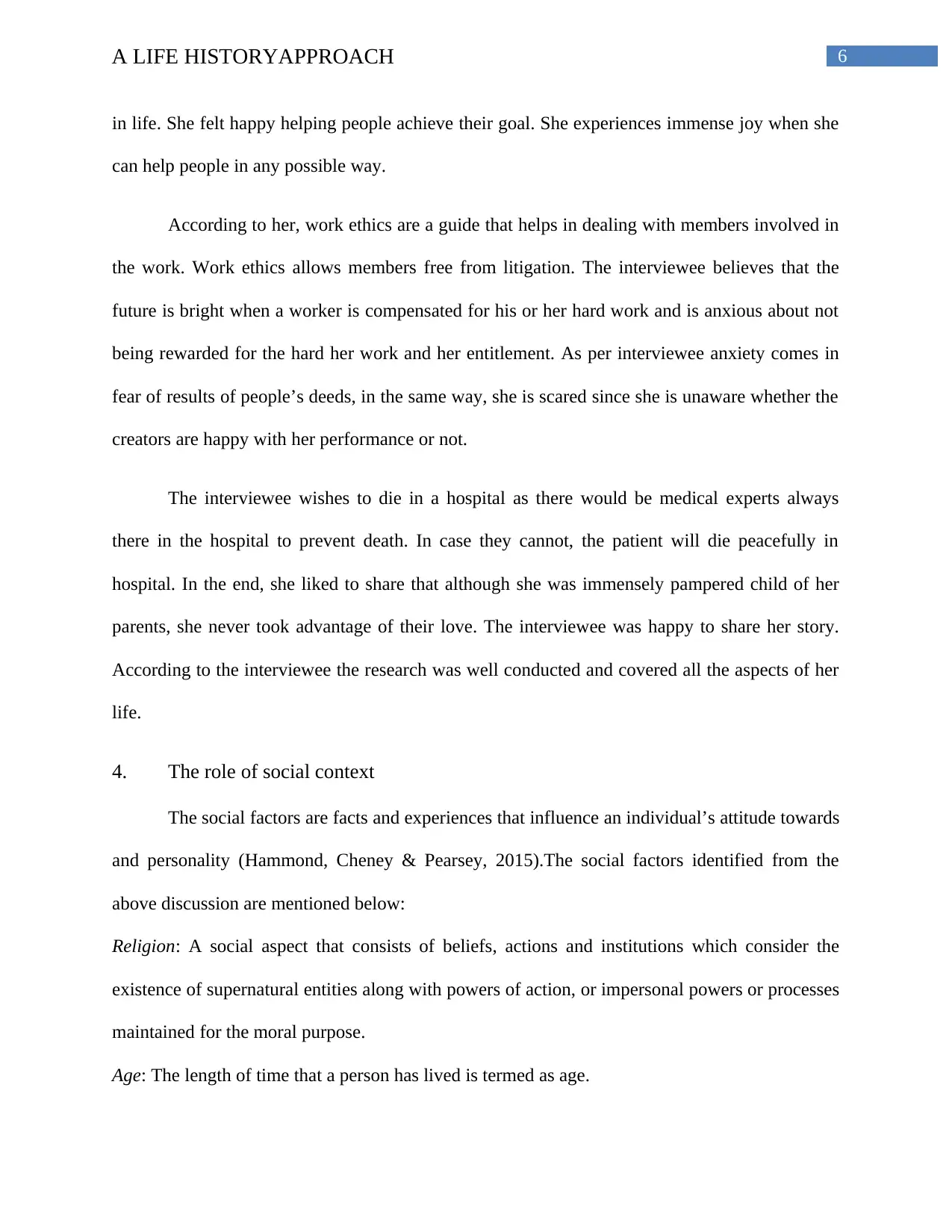
6A LIFE HISTORYAPPROACH
in life. She felt happy helping people achieve their goal. She experiences immense joy when she
can help people in any possible way.
According to her, work ethics are a guide that helps in dealing with members involved in
the work. Work ethics allows members free from litigation. The interviewee believes that the
future is bright when a worker is compensated for his or her hard work and is anxious about not
being rewarded for the hard her work and her entitlement. As per interviewee anxiety comes in
fear of results of people’s deeds, in the same way, she is scared since she is unaware whether the
creators are happy with her performance or not.
The interviewee wishes to die in a hospital as there would be medical experts always
there in the hospital to prevent death. In case they cannot, the patient will die peacefully in
hospital. In the end, she liked to share that although she was immensely pampered child of her
parents, she never took advantage of their love. The interviewee was happy to share her story.
According to the interviewee the research was well conducted and covered all the aspects of her
life.
4. The role of social context
The social factors are facts and experiences that influence an individual’s attitude towards
and personality (Hammond, Cheney & Pearsey, 2015).The social factors identified from the
above discussion are mentioned below:
Religion: A social aspect that consists of beliefs, actions and institutions which consider the
existence of supernatural entities along with powers of action, or impersonal powers or processes
maintained for the moral purpose.
Age: The length of time that a person has lived is termed as age.
in life. She felt happy helping people achieve their goal. She experiences immense joy when she
can help people in any possible way.
According to her, work ethics are a guide that helps in dealing with members involved in
the work. Work ethics allows members free from litigation. The interviewee believes that the
future is bright when a worker is compensated for his or her hard work and is anxious about not
being rewarded for the hard her work and her entitlement. As per interviewee anxiety comes in
fear of results of people’s deeds, in the same way, she is scared since she is unaware whether the
creators are happy with her performance or not.
The interviewee wishes to die in a hospital as there would be medical experts always
there in the hospital to prevent death. In case they cannot, the patient will die peacefully in
hospital. In the end, she liked to share that although she was immensely pampered child of her
parents, she never took advantage of their love. The interviewee was happy to share her story.
According to the interviewee the research was well conducted and covered all the aspects of her
life.
4. The role of social context
The social factors are facts and experiences that influence an individual’s attitude towards
and personality (Hammond, Cheney & Pearsey, 2015).The social factors identified from the
above discussion are mentioned below:
Religion: A social aspect that consists of beliefs, actions and institutions which consider the
existence of supernatural entities along with powers of action, or impersonal powers or processes
maintained for the moral purpose.
Age: The length of time that a person has lived is termed as age.
Paraphrase This Document
Need a fresh take? Get an instant paraphrase of this document with our AI Paraphraser
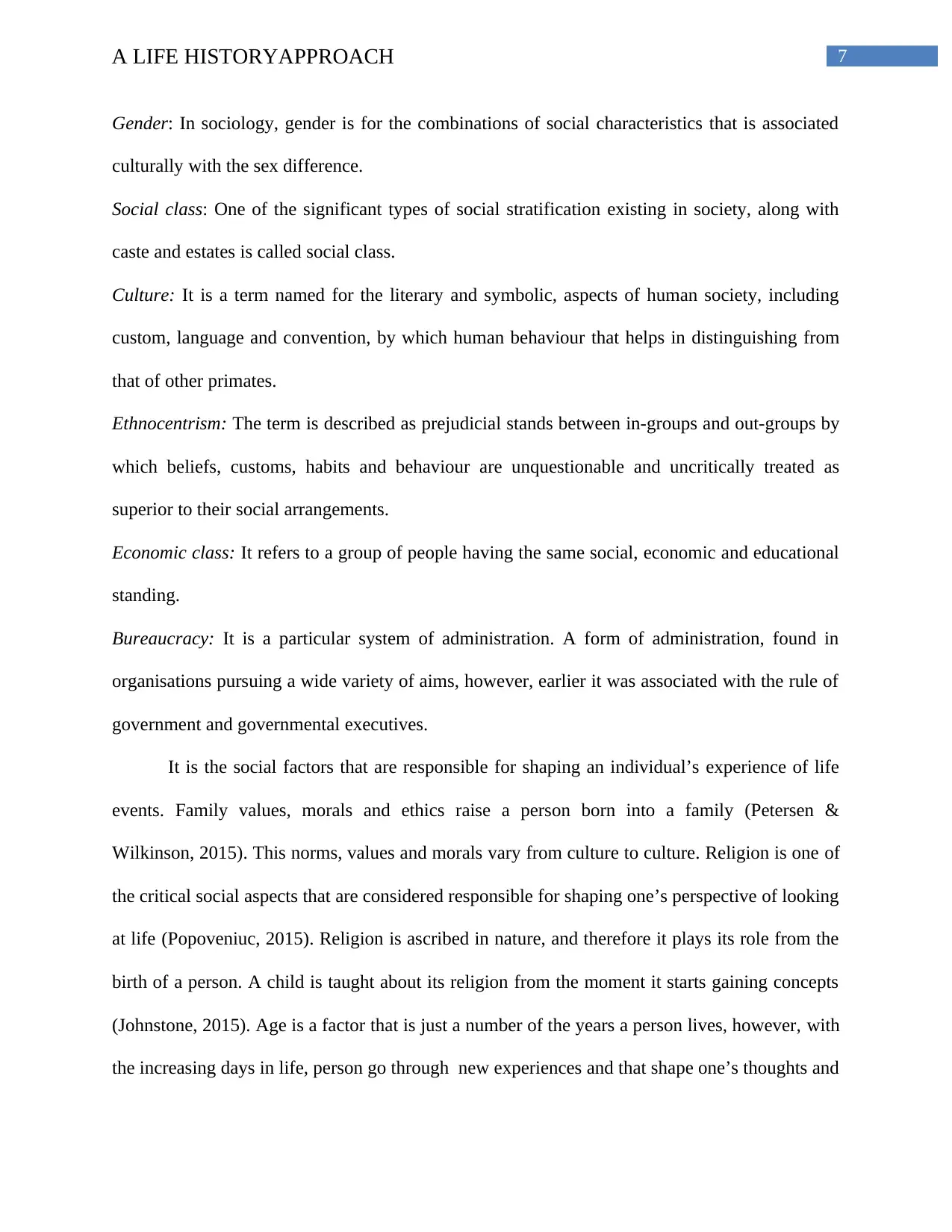
7A LIFE HISTORYAPPROACH
Gender: In sociology, gender is for the combinations of social characteristics that is associated
culturally with the sex difference.
Social class: One of the significant types of social stratification existing in society, along with
caste and estates is called social class.
Culture: It is a term named for the literary and symbolic, aspects of human society, including
custom, language and convention, by which human behaviour that helps in distinguishing from
that of other primates.
Ethnocentrism: The term is described as prejudicial stands between in-groups and out-groups by
which beliefs, customs, habits and behaviour are unquestionable and uncritically treated as
superior to their social arrangements.
Economic class: It refers to a group of people having the same social, economic and educational
standing.
Bureaucracy: It is a particular system of administration. A form of administration, found in
organisations pursuing a wide variety of aims, however, earlier it was associated with the rule of
government and governmental executives.
It is the social factors that are responsible for shaping an individual’s experience of life
events. Family values, morals and ethics raise a person born into a family (Petersen &
Wilkinson, 2015). This norms, values and morals vary from culture to culture. Religion is one of
the critical social aspects that are considered responsible for shaping one’s perspective of looking
at life (Popoveniuc, 2015). Religion is ascribed in nature, and therefore it plays its role from the
birth of a person. A child is taught about its religion from the moment it starts gaining concepts
(Johnstone, 2015). Age is a factor that is just a number of the years a person lives, however, with
the increasing days in life, person go through new experiences and that shape one’s thoughts and
Gender: In sociology, gender is for the combinations of social characteristics that is associated
culturally with the sex difference.
Social class: One of the significant types of social stratification existing in society, along with
caste and estates is called social class.
Culture: It is a term named for the literary and symbolic, aspects of human society, including
custom, language and convention, by which human behaviour that helps in distinguishing from
that of other primates.
Ethnocentrism: The term is described as prejudicial stands between in-groups and out-groups by
which beliefs, customs, habits and behaviour are unquestionable and uncritically treated as
superior to their social arrangements.
Economic class: It refers to a group of people having the same social, economic and educational
standing.
Bureaucracy: It is a particular system of administration. A form of administration, found in
organisations pursuing a wide variety of aims, however, earlier it was associated with the rule of
government and governmental executives.
It is the social factors that are responsible for shaping an individual’s experience of life
events. Family values, morals and ethics raise a person born into a family (Petersen &
Wilkinson, 2015). This norms, values and morals vary from culture to culture. Religion is one of
the critical social aspects that are considered responsible for shaping one’s perspective of looking
at life (Popoveniuc, 2015). Religion is ascribed in nature, and therefore it plays its role from the
birth of a person. A child is taught about its religion from the moment it starts gaining concepts
(Johnstone, 2015). Age is a factor that is just a number of the years a person lives, however, with
the increasing days in life, person go through new experiences and that shape one’s thoughts and
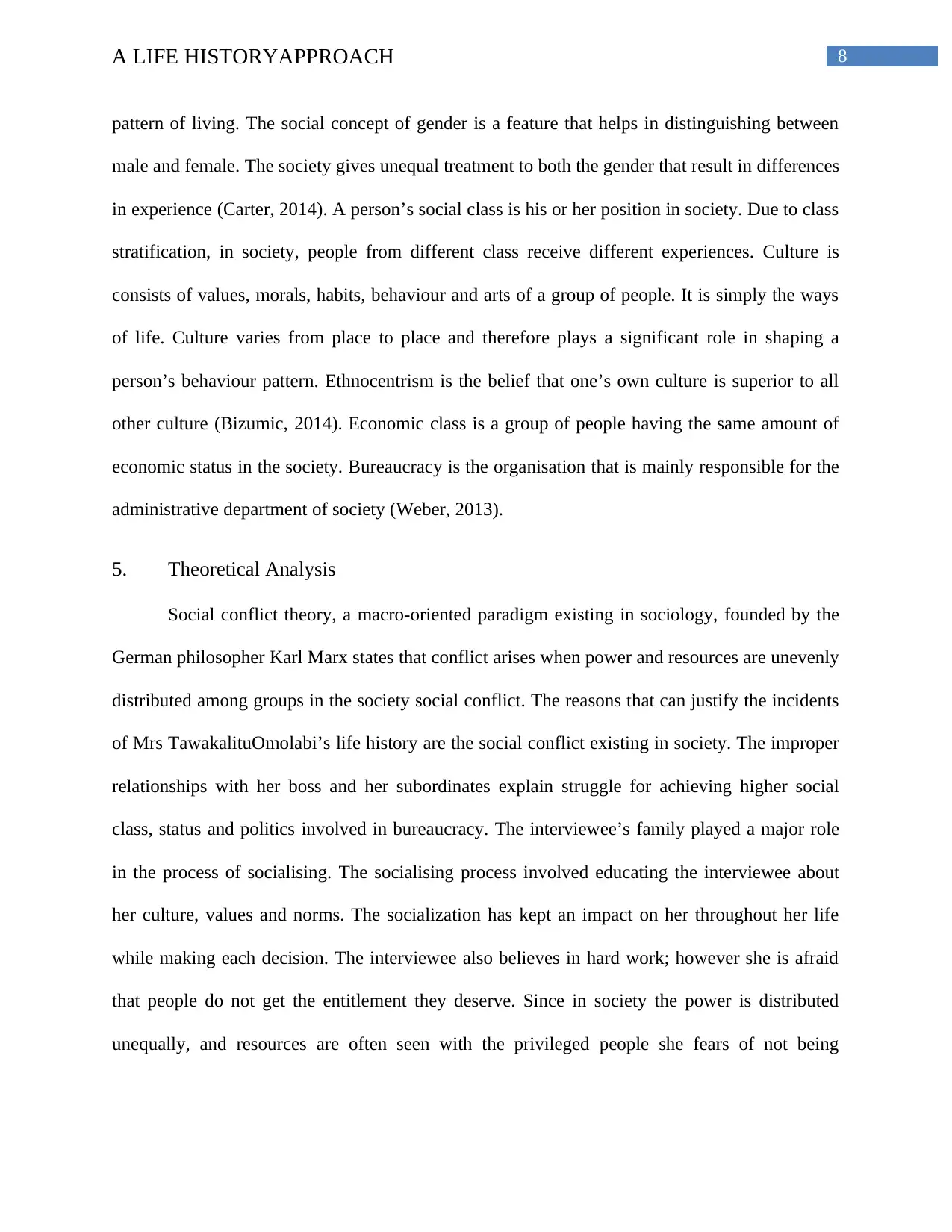
8A LIFE HISTORYAPPROACH
pattern of living. The social concept of gender is a feature that helps in distinguishing between
male and female. The society gives unequal treatment to both the gender that result in differences
in experience (Carter, 2014). A person’s social class is his or her position in society. Due to class
stratification, in society, people from different class receive different experiences. Culture is
consists of values, morals, habits, behaviour and arts of a group of people. It is simply the ways
of life. Culture varies from place to place and therefore plays a significant role in shaping a
person’s behaviour pattern. Ethnocentrism is the belief that one’s own culture is superior to all
other culture (Bizumic, 2014). Economic class is a group of people having the same amount of
economic status in the society. Bureaucracy is the organisation that is mainly responsible for the
administrative department of society (Weber, 2013).
5. Theoretical Analysis
Social conflict theory, a macro-oriented paradigm existing in sociology, founded by the
German philosopher Karl Marx states that conflict arises when power and resources are unevenly
distributed among groups in the society social conflict. The reasons that can justify the incidents
of Mrs TawakalituOmolabi’s life history are the social conflict existing in society. The improper
relationships with her boss and her subordinates explain struggle for achieving higher social
class, status and politics involved in bureaucracy. The interviewee’s family played a major role
in the process of socialising. The socialising process involved educating the interviewee about
her culture, values and norms. The socialization has kept an impact on her throughout her life
while making each decision. The interviewee also believes in hard work; however she is afraid
that people do not get the entitlement they deserve. Since in society the power is distributed
unequally, and resources are often seen with the privileged people she fears of not being
pattern of living. The social concept of gender is a feature that helps in distinguishing between
male and female. The society gives unequal treatment to both the gender that result in differences
in experience (Carter, 2014). A person’s social class is his or her position in society. Due to class
stratification, in society, people from different class receive different experiences. Culture is
consists of values, morals, habits, behaviour and arts of a group of people. It is simply the ways
of life. Culture varies from place to place and therefore plays a significant role in shaping a
person’s behaviour pattern. Ethnocentrism is the belief that one’s own culture is superior to all
other culture (Bizumic, 2014). Economic class is a group of people having the same amount of
economic status in the society. Bureaucracy is the organisation that is mainly responsible for the
administrative department of society (Weber, 2013).
5. Theoretical Analysis
Social conflict theory, a macro-oriented paradigm existing in sociology, founded by the
German philosopher Karl Marx states that conflict arises when power and resources are unevenly
distributed among groups in the society social conflict. The reasons that can justify the incidents
of Mrs TawakalituOmolabi’s life history are the social conflict existing in society. The improper
relationships with her boss and her subordinates explain struggle for achieving higher social
class, status and politics involved in bureaucracy. The interviewee’s family played a major role
in the process of socialising. The socialising process involved educating the interviewee about
her culture, values and norms. The socialization has kept an impact on her throughout her life
while making each decision. The interviewee also believes in hard work; however she is afraid
that people do not get the entitlement they deserve. Since in society the power is distributed
unequally, and resources are often seen with the privileged people she fears of not being
⊘ This is a preview!⊘
Do you want full access?
Subscribe today to unlock all pages.

Trusted by 1+ million students worldwide
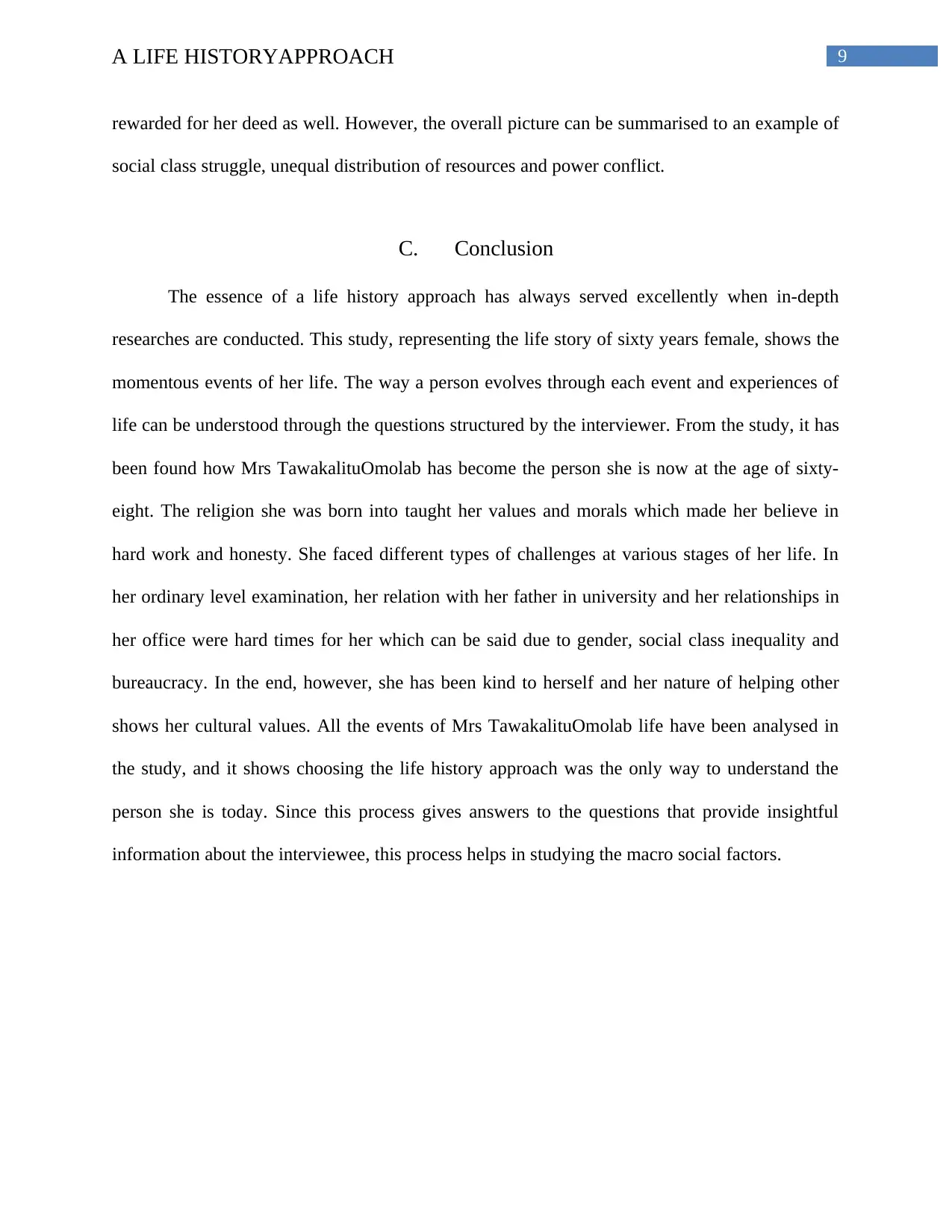
9A LIFE HISTORYAPPROACH
rewarded for her deed as well. However, the overall picture can be summarised to an example of
social class struggle, unequal distribution of resources and power conflict.
C. Conclusion
The essence of a life history approach has always served excellently when in-depth
researches are conducted. This study, representing the life story of sixty years female, shows the
momentous events of her life. The way a person evolves through each event and experiences of
life can be understood through the questions structured by the interviewer. From the study, it has
been found how Mrs TawakalituOmolab has become the person she is now at the age of sixty-
eight. The religion she was born into taught her values and morals which made her believe in
hard work and honesty. She faced different types of challenges at various stages of her life. In
her ordinary level examination, her relation with her father in university and her relationships in
her office were hard times for her which can be said due to gender, social class inequality and
bureaucracy. In the end, however, she has been kind to herself and her nature of helping other
shows her cultural values. All the events of Mrs TawakalituOmolab life have been analysed in
the study, and it shows choosing the life history approach was the only way to understand the
person she is today. Since this process gives answers to the questions that provide insightful
information about the interviewee, this process helps in studying the macro social factors.
rewarded for her deed as well. However, the overall picture can be summarised to an example of
social class struggle, unequal distribution of resources and power conflict.
C. Conclusion
The essence of a life history approach has always served excellently when in-depth
researches are conducted. This study, representing the life story of sixty years female, shows the
momentous events of her life. The way a person evolves through each event and experiences of
life can be understood through the questions structured by the interviewer. From the study, it has
been found how Mrs TawakalituOmolab has become the person she is now at the age of sixty-
eight. The religion she was born into taught her values and morals which made her believe in
hard work and honesty. She faced different types of challenges at various stages of her life. In
her ordinary level examination, her relation with her father in university and her relationships in
her office were hard times for her which can be said due to gender, social class inequality and
bureaucracy. In the end, however, she has been kind to herself and her nature of helping other
shows her cultural values. All the events of Mrs TawakalituOmolab life have been analysed in
the study, and it shows choosing the life history approach was the only way to understand the
person she is today. Since this process gives answers to the questions that provide insightful
information about the interviewee, this process helps in studying the macro social factors.
Paraphrase This Document
Need a fresh take? Get an instant paraphrase of this document with our AI Paraphraser
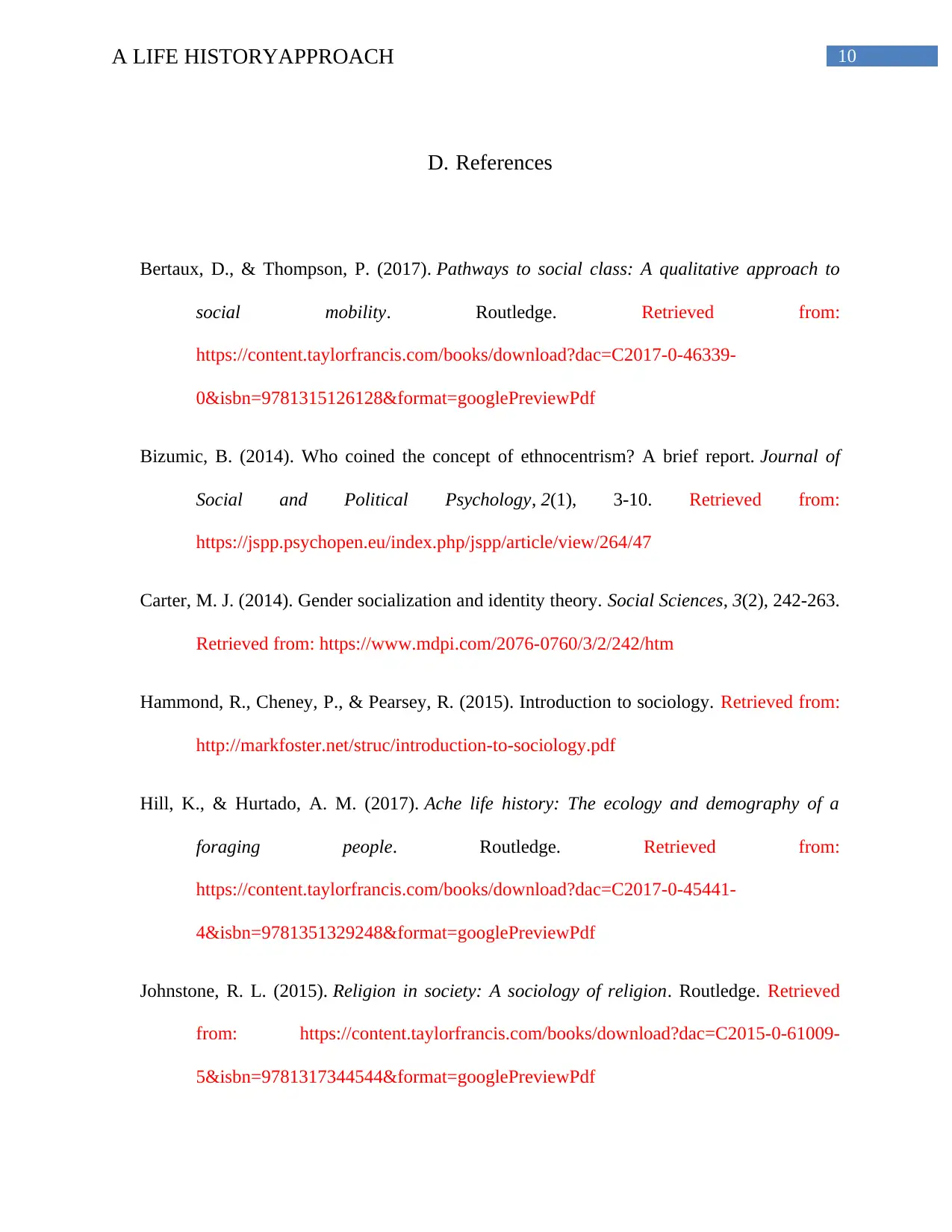
10A LIFE HISTORYAPPROACH
D. References
Bertaux, D., & Thompson, P. (2017). Pathways to social class: A qualitative approach to
social mobility. Routledge. Retrieved from:
https://content.taylorfrancis.com/books/download?dac=C2017-0-46339-
0&isbn=9781315126128&format=googlePreviewPdf
Bizumic, B. (2014). Who coined the concept of ethnocentrism? A brief report. Journal of
Social and Political Psychology, 2(1), 3-10. Retrieved from:
https://jspp.psychopen.eu/index.php/jspp/article/view/264/47
Carter, M. J. (2014). Gender socialization and identity theory. Social Sciences, 3(2), 242-263.
Retrieved from: https://www.mdpi.com/2076-0760/3/2/242/htm
Hammond, R., Cheney, P., & Pearsey, R. (2015). Introduction to sociology. Retrieved from:
http://markfoster.net/struc/introduction-to-sociology.pdf
Hill, K., & Hurtado, A. M. (2017). Ache life history: The ecology and demography of a
foraging people. Routledge. Retrieved from:
https://content.taylorfrancis.com/books/download?dac=C2017-0-45441-
4&isbn=9781351329248&format=googlePreviewPdf
Johnstone, R. L. (2015). Religion in society: A sociology of religion. Routledge. Retrieved
from: https://content.taylorfrancis.com/books/download?dac=C2015-0-61009-
5&isbn=9781317344544&format=googlePreviewPdf
D. References
Bertaux, D., & Thompson, P. (2017). Pathways to social class: A qualitative approach to
social mobility. Routledge. Retrieved from:
https://content.taylorfrancis.com/books/download?dac=C2017-0-46339-
0&isbn=9781315126128&format=googlePreviewPdf
Bizumic, B. (2014). Who coined the concept of ethnocentrism? A brief report. Journal of
Social and Political Psychology, 2(1), 3-10. Retrieved from:
https://jspp.psychopen.eu/index.php/jspp/article/view/264/47
Carter, M. J. (2014). Gender socialization and identity theory. Social Sciences, 3(2), 242-263.
Retrieved from: https://www.mdpi.com/2076-0760/3/2/242/htm
Hammond, R., Cheney, P., & Pearsey, R. (2015). Introduction to sociology. Retrieved from:
http://markfoster.net/struc/introduction-to-sociology.pdf
Hill, K., & Hurtado, A. M. (2017). Ache life history: The ecology and demography of a
foraging people. Routledge. Retrieved from:
https://content.taylorfrancis.com/books/download?dac=C2017-0-45441-
4&isbn=9781351329248&format=googlePreviewPdf
Johnstone, R. L. (2015). Religion in society: A sociology of religion. Routledge. Retrieved
from: https://content.taylorfrancis.com/books/download?dac=C2015-0-61009-
5&isbn=9781317344544&format=googlePreviewPdf
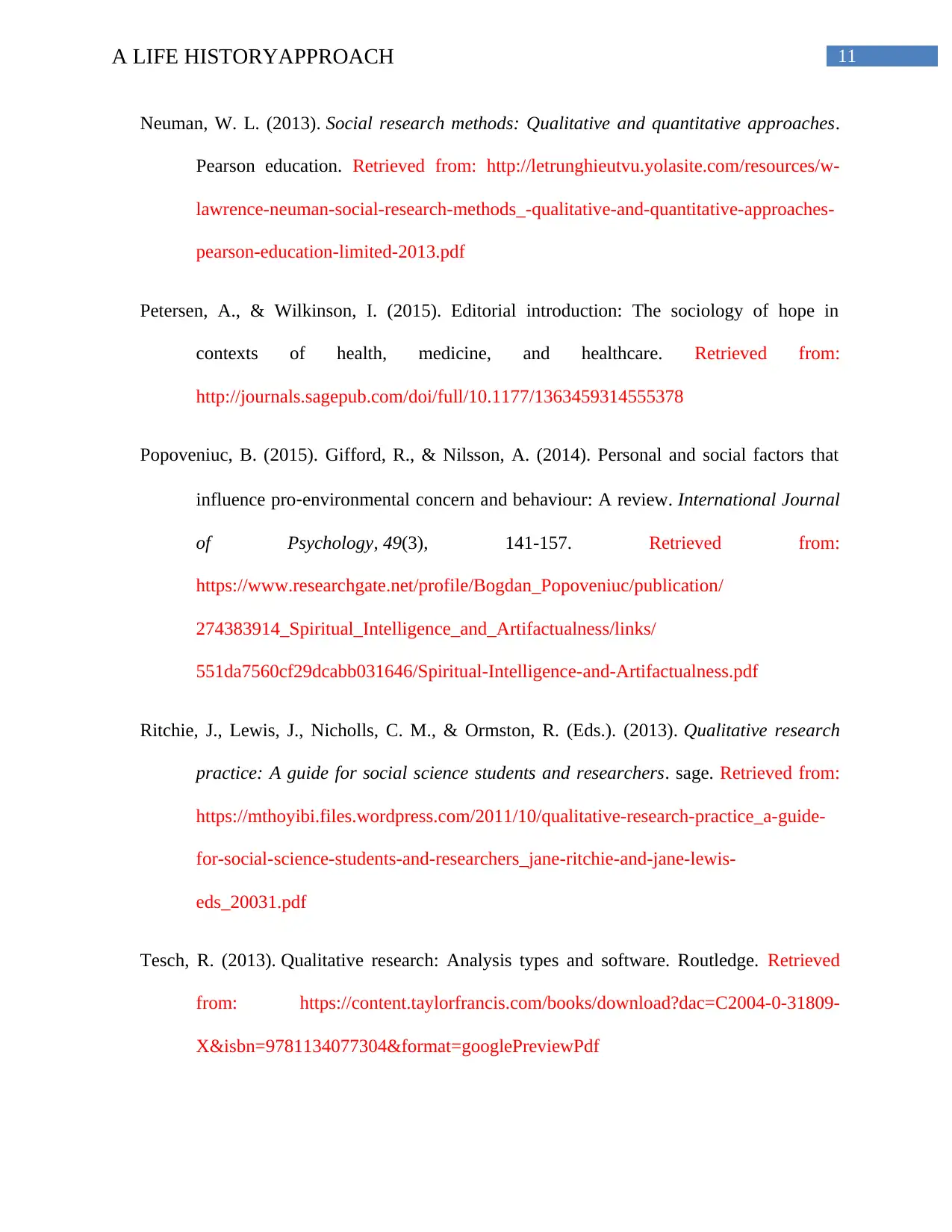
11A LIFE HISTORYAPPROACH
Neuman, W. L. (2013). Social research methods: Qualitative and quantitative approaches.
Pearson education. Retrieved from: http://letrunghieutvu.yolasite.com/resources/w-
lawrence-neuman-social-research-methods_-qualitative-and-quantitative-approaches-
pearson-education-limited-2013.pdf
Petersen, A., & Wilkinson, I. (2015). Editorial introduction: The sociology of hope in
contexts of health, medicine, and healthcare. Retrieved from:
http://journals.sagepub.com/doi/full/10.1177/1363459314555378
Popoveniuc, B. (2015). Gifford, R., & Nilsson, A. (2014). Personal and social factors that
influence pro‐environmental concern and behaviour: A review. International Journal
of Psychology, 49(3), 141-157. Retrieved from:
https://www.researchgate.net/profile/Bogdan_Popoveniuc/publication/
274383914_Spiritual_Intelligence_and_Artifactualness/links/
551da7560cf29dcabb031646/Spiritual-Intelligence-and-Artifactualness.pdf
Ritchie, J., Lewis, J., Nicholls, C. M., & Ormston, R. (Eds.). (2013). Qualitative research
practice: A guide for social science students and researchers. sage. Retrieved from:
https://mthoyibi.files.wordpress.com/2011/10/qualitative-research-practice_a-guide-
for-social-science-students-and-researchers_jane-ritchie-and-jane-lewis-
eds_20031.pdf
Tesch, R. (2013). Qualitative research: Analysis types and software. Routledge. Retrieved
from: https://content.taylorfrancis.com/books/download?dac=C2004-0-31809-
X&isbn=9781134077304&format=googlePreviewPdf
Neuman, W. L. (2013). Social research methods: Qualitative and quantitative approaches.
Pearson education. Retrieved from: http://letrunghieutvu.yolasite.com/resources/w-
lawrence-neuman-social-research-methods_-qualitative-and-quantitative-approaches-
pearson-education-limited-2013.pdf
Petersen, A., & Wilkinson, I. (2015). Editorial introduction: The sociology of hope in
contexts of health, medicine, and healthcare. Retrieved from:
http://journals.sagepub.com/doi/full/10.1177/1363459314555378
Popoveniuc, B. (2015). Gifford, R., & Nilsson, A. (2014). Personal and social factors that
influence pro‐environmental concern and behaviour: A review. International Journal
of Psychology, 49(3), 141-157. Retrieved from:
https://www.researchgate.net/profile/Bogdan_Popoveniuc/publication/
274383914_Spiritual_Intelligence_and_Artifactualness/links/
551da7560cf29dcabb031646/Spiritual-Intelligence-and-Artifactualness.pdf
Ritchie, J., Lewis, J., Nicholls, C. M., & Ormston, R. (Eds.). (2013). Qualitative research
practice: A guide for social science students and researchers. sage. Retrieved from:
https://mthoyibi.files.wordpress.com/2011/10/qualitative-research-practice_a-guide-
for-social-science-students-and-researchers_jane-ritchie-and-jane-lewis-
eds_20031.pdf
Tesch, R. (2013). Qualitative research: Analysis types and software. Routledge. Retrieved
from: https://content.taylorfrancis.com/books/download?dac=C2004-0-31809-
X&isbn=9781134077304&format=googlePreviewPdf
⊘ This is a preview!⊘
Do you want full access?
Subscribe today to unlock all pages.

Trusted by 1+ million students worldwide
1 out of 13
Related Documents
Your All-in-One AI-Powered Toolkit for Academic Success.
+13062052269
info@desklib.com
Available 24*7 on WhatsApp / Email
![[object Object]](/_next/static/media/star-bottom.7253800d.svg)
Unlock your academic potential
Copyright © 2020–2026 A2Z Services. All Rights Reserved. Developed and managed by ZUCOL.




